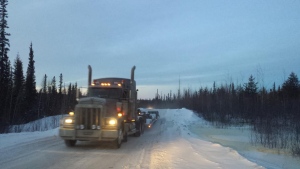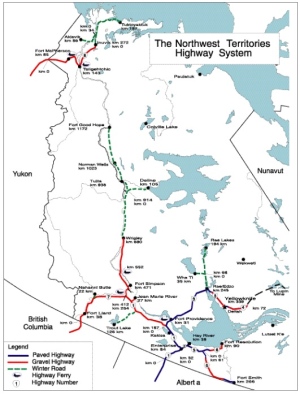Winter road restrictions criticized in Canada’s N.W.T.

It’s an annual precaution on the Sahtu winter road, which runs through the heart of Canada’s Northwest Territories.
When warmer weather, and more sunlight arrives, the territorial government restricts commercial trucks to night-time driving only to avoid major damage to the road.
But this year, a distribution company in the community of Hay River is crying foul.
Daniel Burger, operations supervisor for Bassett Petroleum Distributors, says the precaution comes too early, and only exists to save the government money.
“I feel the government should spend the resources to keep a road open rather than saying, ‘Let’s restrict the travel on the road,’” Burger says.
The GNWT has said they may add the restriction as early as this Sunday, when temperatures in the Sahtu region are expected to rise to -18 C. They say warmer temperatures, mixed with direct sunlight, make for poor conditions on the road, and heavy vehicles can cause serious damage.
“What ends up happening is that the heat of the tires going over the winter road, in combination with those conditions, causes rutting,” says Earl Blacklock, who speaks for the department of transportation.
Blacklock says money doesn’t enter into it.

The goal is to avoid the kind of damage that could force them to close the road to all traffic, not just heavy trucks, while repairs are made.
That was the case last year when daytime road closures in late March were ignored by four trucks, and parts of the road were closed early.
Burger says the daytime restriction means some of his workers have to switch shifts.
“It’s one thing we try to prevent: any night driving or any flipping around of a driver’s schedule because the danger of fatigue while driving is intense and you know, us being in the trucking industry, a huge focus is the safety of our drivers.”
He says restrictions at this time of year just aren’t necessary.
“There are a lot of players up there doing a lot of work on this road, and the communities are relying on this road, to get the goods and services in before the end of the season.”
The department of transportation will post updates on closures on its website.
Related Links:
Canada: Winter road to open this week in Yukon’s Arctic, CBC News
United States:Ice-road construction reaches new levels in Arctic Alaska, Alaska Dispatch
Russia: Siberia’s ice road truckers: ‘A way of life,’ says writer, CBC News


